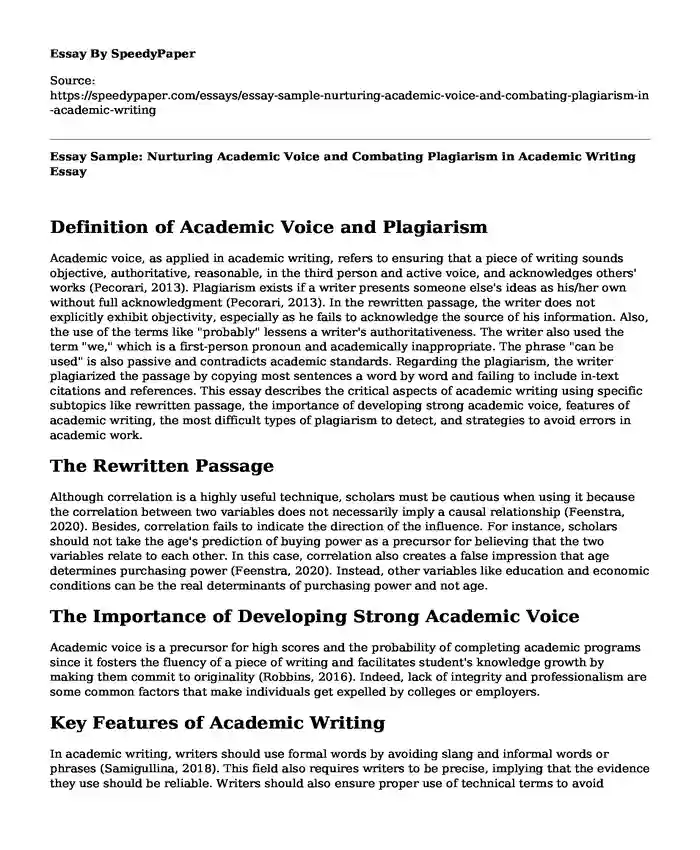
| Type of paper: | Essay |
| Categories: | Education |
| Pages: | 3 |
| Wordcount: | 764 words |
Definition of Academic Voice and Plagiarism
Academic voice, as applied in academic writing, refers to ensuring that a piece of writing sounds objective, authoritative, reasonable, in the third person and active voice, and acknowledges others' works (Pecorari, 2013). Plagiarism exists if a writer presents someone else's ideas as his/her own without full acknowledgment (Pecorari, 2013). In the rewritten passage, the writer does not explicitly exhibit objectivity, especially as he fails to acknowledge the source of his information. Also, the use of the terms like "probably" lessens a writer's authoritativeness. The writer also used the term "we," which is a first-person pronoun and academically inappropriate. The phrase "can be used" is also passive and contradicts academic standards. Regarding the plagiarism, the writer plagiarized the passage by copying most sentences a word by word and failing to include in-text citations and references. This essay describes the critical aspects of academic writing using specific subtopics like rewritten passage, the importance of developing strong academic voice, features of academic writing, the most difficult types of plagiarism to detect, and strategies to avoid errors in academic work.
The Rewritten Passage
Although correlation is a highly useful technique, scholars must be cautious when using it because the correlation between two variables does not necessarily imply a causal relationship (Feenstra, 2020). Besides, correlation fails to indicate the direction of the influence. For instance, scholars should not take the age's prediction of buying power as a precursor for believing that the two variables relate to each other. In this case, correlation also creates a false impression that age determines purchasing power (Feenstra, 2020). Instead, other variables like education and economic conditions can be the real determinants of purchasing power and not age.
The Importance of Developing Strong Academic Voice
Academic voice is a precursor for high scores and the probability of completing academic programs since it fosters the fluency of a piece of writing and facilitates student's knowledge growth by making them commit to originality (Robbins, 2016). Indeed, lack of integrity and professionalism are some common factors that make individuals get expelled by colleges or employers.
Key Features of Academic Writing
In academic writing, writers should use formal words by avoiding slang and informal words or phrases (Samigullina, 2018). This field also requires writers to be precise, implying that the evidence they use should be reliable. Writers should also ensure proper use of technical terms to avoid confusing readers. Additionally, they need to structure an essay using subtopics and sections to enhance clarity. Objectivity is also a critical feature of academic writing that restricts personal opinion (Samigullina, 2018). Lastly, academic writers should exercise hedging, which implies determining an appropriate strength of conclusions (Samigullina, 2018). For example, tutors encourage using statements like "this could be" instead of "this proves."
The Types of Plagiarism Most Difficult to Address
Accidental plagiarism is a difficult form of plagiarism to avoid because it occurs if a writer unintentionally misquotes or paraphrases a source without attribution. Mosaic plagiarism is also difficult to avoid since it exists as long as a writer keeps the original idea of the source where he/she borrows information (Kumar et al., 2014).
Strategies to Avoid Errors in Academic Work
To avoid the errors discussed above, a writer should proofread his/her work, being keen to correct passive voice whenever necessary, tone, structure, and citations. He/she should ensure that the work does not include unacknowledged paraphrases or others' ideas. Specifically, the writer needs to restructure sentences to avoid presenting other people's ideas as his/hers and use plagiarism checkers to identify plagiarized pieces of information (Kumar et al., 2014).
Conclusion
The discussion indicates that academic writers should avoid slang, include reliable evidence, and ensure proper use of technical terms. They should also be keen to avoid plagiarism, even its most difficult types to detect like accidental plagiarism and mosaic plagiarism. Complying with these standards is vital because it is a prerequisite for high academic performance and professional growth.
References
Feenstra, J. (2020). Social psychology (2nd Ed.). Bridgepoint Education, Inc.
Kumar, P. M., Priya, N. S., Musalaiah, S. V. V. S., & Nagasree, M. (2014). Knowing and avoiding plagiarism during scientific writing. Annals of Medical and Health Sciences Research, 4(3), 193-198. https://www.ncbi.nlm.nih.gov/pmc/articles/PMC4212376/
Pecorari, D. (2013). Teaching to avoid plagiarism: How to promote good source use. Maidenhead, Berkshire, England: Open University Press.
Robbins, S. P. (2016). Finding your voice as an academic writer (and writing clearly). Journal of Social Work Education, 52(2), 133-135. DOI: 10.1080/10437797.2016.1151267
Samigullina, A. D. (2018). Teaching first year students features of academic writing (complexity, formality, objectivity, responsibility). Russian Linguistic Bulletin, 2(14), 38-41. https://doi.org/10.18454/RULB.2018.14.2.2
Cite this page
Essay Sample: Nurturing Academic Voice and Combating Plagiarism in Academic Writing. (2023, Oct 15). Retrieved from https://speedypaper.net/essays/essay-sample-nurturing-academic-voice-and-combating-plagiarism-in-academic-writing
Request Removal
If you are the original author of this essay and no longer wish to have it published on the SpeedyPaper website, please click below to request its removal:
- Essay Example on an Explanation of the Differential Diagnosis for the Patient
- Education Essay Sample: Alternative Observation of Teaching Approaches
- Free Essay Example - Genre Comparison
- Paper Example: Experimental Versus Observational Study
- Free Essay Sample on Golf Learning Styles and Their Impact in Chinese Universities
- Analyzing the National Education Association's Strategic Plan - Free Paper
- Emerging Curriculum. Paper Example
Popular categories




